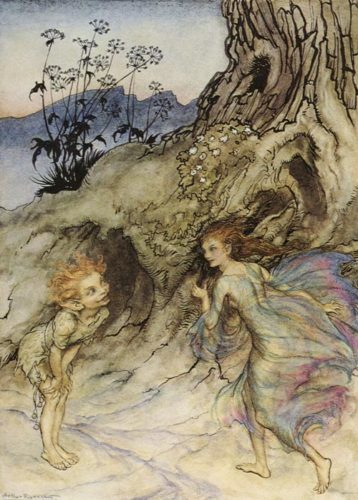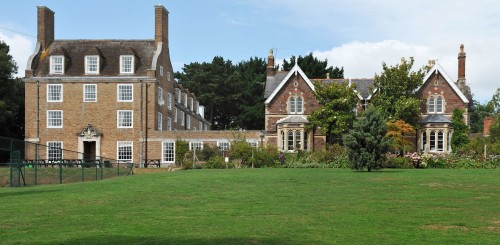EXETER, UK – The University of Exeter is currently sponsoring a postgraduate research project on how to summon fairies and demons. Researchers will be examining the role of fairies in grimoires dating from the 15th to the 17th centuries, old magical texts which contain instructions for performing spells and necromancy.
Fairies have obviously played a major part in British folklore for generations, appearing in the works of Shakespeare as well as local stories and legends. The West Country, where Exeter is situated, is full of such tales, from the uplands of Dartmoor to the coasts of Cornwall. Not always benign, these supernatural entities both fear and fascinate, but the aim of some of the spells in the study is to obtain the help of fairies in achieving the goals of the magician.

Puck and a Fairy, Arthur Rackham [public domain.]
“The study of the history of magic is a rich vein for analysis and insight into the history of thought, religion, medicine, science, and philosophy,” Mr Hogan said. “It shows much about beliefs at the time. By fully understanding these practices, we can often reconstruct how it was perfectly rational given contemporary beliefs.
“It’s easy to look down our noses at past or present cultures and dismiss them as ‘backwards’ or ‘primitive,’ but intimately understanding these very different worldviews emphasises that our own is simply one among many.”
Hogan undertook an undergraduate degree at Memorial University in Newfoundland, including an honours major in History and a general major in Medieval Studies. His undergraduate thesis was entitled “Rituals Intended to Summon Assistant Spirits from the Greek Magical Papyri.”
“I specialize in the history of magic,” Hogan says. “It’s the only thing I’ve ever wanted to do. I decided that I wanted to become someday a professor of the history of magic in grade 11.”
Hogan’s initial impression was that he would be one of the first scholars to do this, but although he is still one of the relatively few people to be studying the history of magic, the field is growing quite quickly. There is already is an international society of scholars dedicated to the subject, the Societas Magica, established in 1994 in the US. Hogan’s tutor, Frank Klaassen, was at one time the President of the SM.
Hogan’s own work includes a paper titled “Cheating Death: An Exploration of the Relationship Between Medieval Concepts of Death and the Alchemical Aspiration for Immortality.” It focused on the use of alchemy in the attempt to achieve immortality and how this conflicted with the Christian approach to the afterlife. The paper won Hogan the university’s Pro Vice-Chancellor’s Prize. He said it was at that moment that he realized he could make a career in the history of magic and have it recognized in academic circles.
Hogan wrote his master’s thesis on the 27 surviving manuscripts written between 1160 and 1500 relating to the performance of chiromancy, a form of divination.
Hogan was in a quiet study area at the time when he got the news of his Exeter fellowship. “I hurt my side because I was suppressing my jubilation to be quiet,” he said.

Exeter University Lopes Hall [Smalljim, via Wikimedia.]
“The purpose of the Exeter Centre for the Study of Esotericism (EXESESO) [was] to foster advanced research into historical and comparative aspects of the esoteric traditions from the Hellenistic period in late antiquity through the Renaissance and early modern period to the present. Staff members in the departments of History (with interests in religion, culture, science and medicine), Sociology and Philosophy, Theology, Classics and Ancient History, and the Institute of Arab and Islamic Studies, collaborate in seminars, research and publications. Literary and philosophical traditions are also examined by colleagues in the Schools of English and Modern Languages (departments of French, German, Italian, Hispanic Studies, and Russian).”
Sadly, the untimely death of Goodrick-Clarke meant that EXESESO lost its helmsman, and the program was closed in 2014:
Goodrick-Clarkeʼs early death in 2012 marked the beginning of the end. According to Exeterʼs press office, the decision to close the center and program followed “an internal review and discussions with the [Blavatsky] Trust,” and Goodrick-Clarkeʼs death “sat alongside consideration for the programme as a whole.” Exeterʼs press office was unable to comment on the conclusions of the internal review, but there were suggestions that it was not entirely positive. Exeter has made arrangements for the centreʼs remaining PhD students to complete their projects in the history department […]. But Europe now once more has only two MA programs in Western esotericism, not three, which is an unfortunate setback for the development of the study of Western Esotericism in Europe.
Exeter’s history department still runs a module in the western esoteric traditions, however.
There are other analogous programs in European universities: the University of Groningen runs a postgraduate degree in “Concealed Knowledge: Gnosticism, Mysticism and Esoterism,” and the University of Gothenburg also runs a masters in occultism and mysticism. As we have seen in a Wild Hunt article in August, the Ashmolean Museum in Oxford is involved in a major Leverhulme research project on the history of magical practice in Britain.
Hogan himself has remarked on his gratitude at being able to study at Exeter. “It makes me want to pay back the universe in general for allowing me to be fortunate enough to do this.”
The Wild Hunt is not responsible for links to external content.
To join a conversation on this post:
Visit our The Wild Hunt subreddit! Point your favorite browser to https://www.reddit.com/r/The_Wild_Hunt_News/, then click “JOIN”. Make sure to click the bell, too, to be notified of new articles posted to our subreddit.